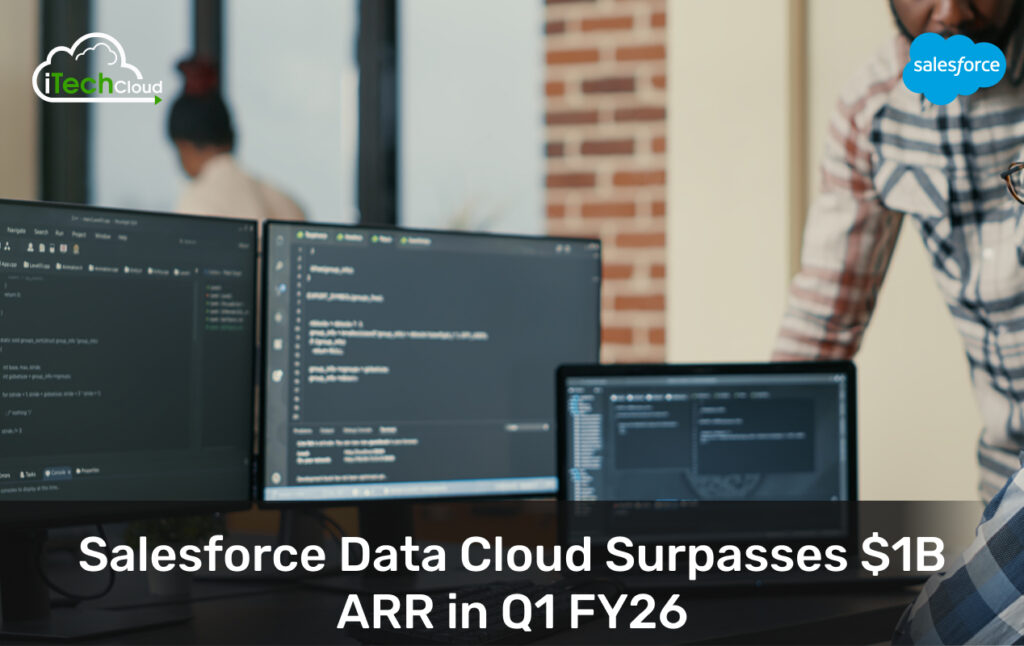Salesforce Data Cloud Surpasses $1B ARR in Q1 FY26

Introduction: Salesforce Data Cloud Surpasses
Salesforce has once again demonstrated its dominance in the enterprise software market with its Data Cloud platform surpassing $1 billion in Annual Recurring Revenue (ARR) in the first quarter of fiscal year 2026. This milestone underscores the growing importance of AI-driven data unification, real-time customer insights, and hyper-personalized engagement in modern business strategies.
Table of Contents
1. What is Salesforce Data Cloud?
Salesforce Data Cloud (formerly known as Genie) is an AI-powered customer data platform (CDP) that unifies, analyzes, and activates data across multiple sources in real time. It enables businesses to:
- Break down data silos by integrating CRM, ERP, marketing, sales, service, and third-party data.
- Create a 360-degree customer view by stitching together fragmented data points.
- Leverage AI (Einstein AI) for predictive insights to anticipate customer needs.
- Automate personalized experiences across marketing, sales, and service teams.
Data Cloud operates in real time, allowing businesses to act on insights instantaneously, whether for hyper-targeted marketing, dynamic pricing, or proactive customer service.
Why Is This a Game-Changer?
- Eliminates manual data integration: Reduces IT dependency with no-code/low-code tools.
- Enables real-time decision-making: AI-driven insights help businesses act faster than competitors.
- Scales with enterprise needs: Handles massive data volumes across industries (financial services, retail, healthcare, etc.).
2. How Salesforce Data Cloud Achieved $1B ARR in Q1 FY26
Reaching $1B ARR in such a short time is a testament to Data Cloud rapid adoption. Several key factors contributed to this growth:
A. Strong Demand for AI-Driven Data Unification
- Businesses are drowning in data but struggling to derive actionable insights.
- Data Cloud’s AI-powered unification solves this by automating data harmonization.
B. Tight Integration with Salesforce Ecosystem
- Seamless connectivity with Sales Cloud, Service Cloud, Marketing Cloud, and Tableau drives adoption.
- Customers already using Salesforce see faster ROI by adding Data Cloud.
C. Industry-Specific Solutions
- Salesforce has built vertical-specific data models (e.g., healthcare, retail, and financial services).
- Pre-built connectors for Snowflake, AWS, and Google BigQuery reduce implementation time.
D. AI and Automation Driving Efficiency
- Einstein AI automates predictive analytics, reducing manual analysis.
- Real-time triggers (e.g., abandoned cart alerts, service escalations) improve customer experiences.
E. Salesforce Aggressive Go-To-Market Strategy
- Bundled pricing with other Salesforce clouds.
- Strong partnerships with system integrators (Accenture, Deloitte) to accelerate deployments.
3. How Leading Businesses Are Using Data Cloud
A. Retail: Hyper-Personalized Shopping Experiences
- Example: A global retailer uses Data Cloud to unify online/offline purchase history, enabling real-time product recommendations via email and in-store apps.
- Result: 20% increase in average order value (AOV).
B. Financial Services: 360-Degree Customer Risk Profiling
- Example: A bank consolidates transaction data, credit scores, and external risk signals to detect fraud faster.
- Result: 30% reduction in fraudulent transactions.
C. Healthcare: Proactive Patient Engagement
- Example: A hospital network integrates EHR (Electronic Health Records) with appointment scheduling to predict no-shows and send reminders.
- Result: 15% improvement in patient attendance rates.
D. Manufacturing: Predictive Maintenance
- Example: An industrial equipment provider uses IoT sensor data + service history to predict failures before they happen.
- Result: 40% reduction in unplanned downtime.
4. The Future and Trends for Salesforce Data Cloud
A. AI Will Become Even More Embedded
- Expect deeper generative AI integrations (e.g., automated insights, AI-generated reports).
- Autonomous data matching will reduce manual data cleaning.
B. Data Democratization Will Accelerate
- More business users (non-technical) will access insights via natural language queries.
C. Privacy and Compliance Will Be Critical
- With stricter regulations (GDPR, CCPA), zero-copy data architecture (where data isn’t duplicated) will gain traction.
D. Real-Time Data Will Be the New Standard
- Batch processing will fade as businesses demand instant insights (e.g., live pricing adjustments, dynamic ad targeting).
E. Salesforce Will Expand Data Cloud Ecosystem
- More ISV (Independent Software Vendor) integrations (e.g., Adobe, SAP).
- Potential acquisitions to strengthen AI/data capabilities.
5. Key Takeaways for Business Leaders
- Data Unification is No Longer Optional—Siloed data leads to poor decisions. Data Cloud provides a single source of truth.
- AI + Real-Time Insights = Competitive Advantage—Companies using predictive analytics outperform peers.
- Start Small, Scale Fast—Pilot Data Cloud in one department (e.g., marketing) before enterprise-wide rollout.
- Invest in Training—Ensure teams understand how to leverage AI-driven insights.
- Future-Proof Your Data Strategy—Align with platforms that integrate AI, automation, and compliance.
My Takeaway:
Salesforce Data Cloud $1B ARR milestone is more than just a revenue achievement; it’s a validation of the critical role AI-powered data unification plays in modern business. Companies that adopt this technology early will gain a massive competitive edge through faster decision-making, hyper-personalized customer engagement, and operational efficiency. For business leaders, the message is clear: The future belongs to those who harness data in real time. Salesforce Data Cloud is proving to be the platform that makes this possible at scale.

